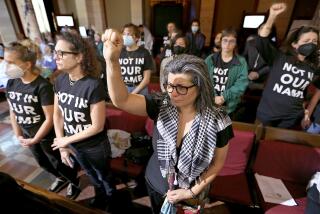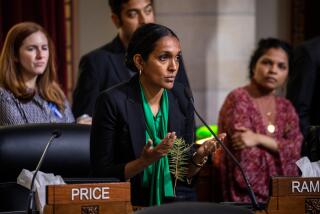Bradley Promised Silence on Farrakhan to Black Leaders
Mayor Tom Bradley has pledged to Los Angeles black leaders not to comment on Louis Farrakhan until after the black Muslim leader speaks here Saturday night, acceding to their request that they handle in their own way the rising controversy over Farrakhan’s anti-Semitic remarks.
That pledge, revealed Thursday in interviews with black and Jewish leaders, explains why Bradley has delayed commenting on the Farrakhan appearance at the Forum. The delay has thrust him into a bitter controversy between leaders of the black and Jewish communities.
Farrakhan, the Nation of Islam leader already well known in the black community and propelled into national prominence last year as a major supporter of the Rev. Jesse Jackson, has been heavily criticized for his assertions that Judaism is a “gutter religion” and, more recently, for a statement in which he referred to the “wickedness” of Jews.
Bradley, whose entire political career has been based on strong black and Jewish support, is caught in a high-pressure tug of war between the two groups.
On another front, he is faced with political challenges from a likely 1986 governor’s race rival, Gov. George Deukmejian, who Wednesday publicly denounced Farrakhan. Los Angeles County supervisor and state Republican chairman Michael Antonovich Thursday also challenged Bradley “to tell the people of Los Angeles where he stands . . . who is he afraid of offending?”
Black community leaders, while condemning the anti-Semitic portions of Farrakhan’s rhetoric, say they support his other messages of black economic development and have been pushing for Bradley to reserve any criticism of Farrakhan until after Farrakhan speaks Saturday. Jewish leaders, saying that Farrakhan has already made his anti-Jewish sentiments well known, have been urging Bradley to repudiate Farrakhan immediately.
Bradley, meeting with several black leaders last week, “made a commitment not to disavow Farrakhan, at least to say nothing until after he spoke Saturday,” said one of those who attended the meeting. Black community leaders have been meeting for the past two weeks in anticipation of protests over Farrakhan’s visit.
On Monday, there was a tense two-hour meeting at Urban League headquarters, during which Jewish leaders asked black leaders to release Bradley from his pledge. The black leaders declined.
Black leaders believed it was important for Bradley to wait until he heard what Farrakhan said, explained Mark Ridley-Thomas, executive director of the Southern Christian Leadership Conference and one of those who attended. The black-Jewish conflict at hand, he said, “is about more than Farrakhan.”
“There is no disagreement between blacks and Jews about the anti-Semitic remarks he made,” Ridley-Thomas said. “It is on what to do about those remarks.
“There is a resistance to the somewhat arrogant posture on the part of some Jewish leaders in telling the black community how it ought to handle its business. Farrakhan has castigated many black leaders for many years, much longer than he has with his recent comments on Jews. But to tell us we must repudiate and disavow the man is not an acceptable solution.”
Jewish community leaders say, however, that Farrakhan’s record as a bigot is clear, and they are outraged that the mayor has not spoken out.
Jewish leaders told Bradley their sentiments in a meeting Sunday at the home of longtime Bradley supporter Bruce Corwin, who is also a leader in the Jewish community. They asked the mayor to join in a press conference denouncing Farrakhan, a request that Jewish leaders had also made to the mayor earlier.
“The mayor told us the black leaders had made a determination they could confront Farrakhan themselves, and the mayor promised them he would not interfere with their efforts to do so,” said Neil Sandberg, western regional director of the American Jewish Committee.
“We pointed out that their approach so far was a fantasy. . . . The Farrakhan record was such that we had every right to expect he would continue his gutter diatribes and anti-Semitic remarks when he came to Los Angeles,” Sandberg said.
Meeting Held
Ridley-Thomas said he and other black community leaders met with personal representatives of Farrakhan Wednesday to tell them they hoped that the Muslim leader would not make anti-Semitic remarks.
He said Jewish leaders first agreed to a suggestion by local black leaders that they meet with Black Muslim officials Thursday, then backed out.
During a Washington speech in July, Farrakhan drew about 10,000 listeners and attacked what he called the “wickedness” of Jews. Washington Mayor Marion Barry was urged by Jewish leaders there to condemn Farrakhan and did in a speech he made Monday. However, one Jewish leader there called it “too little, too late.”
Local political reaction was swift.
Some Jewish Bradley supporters, “are fuming, saying they will not support him for governor,” said one Jewish leader.
There was no indication, however, that the disaffected Jewish leaders had asked Deukmejian to make his anti-Farrakhan statement, although they said they did ask him to sign a newspaper advertisement denouncing the black leader. Deukmejian declined.
Among black leaders, Bradley’s stand has been a show of “self-determination,” said Danny Bakewell, president of the Brotherhood Crusade. “We reserve the right to vehemently disagree with Farrakhan, but we demand the right to be able to embrace some other things he says about self-respect and economics that may be of benefit to the black community.
“I do not demand that my Jewish friends denounce Israel for their dealings with the South African government. I hope our friendship is stronger than that.”
More to Read
Sign up for Essential California
The most important California stories and recommendations in your inbox every morning.
You may occasionally receive promotional content from the Los Angeles Times.










